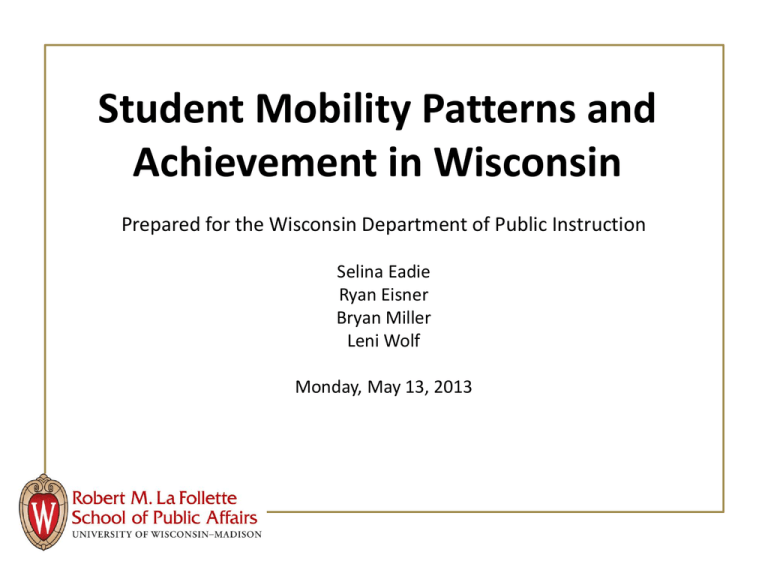Student Mobility Patterns and Achievement in Wisconsin Selina Eadie
advertisement

Student Mobility Patterns and Achievement in Wisconsin Prepared for the Wisconsin Department of Public Instruction Selina Eadie Ryan Eisner Bryan Miller Leni Wolf Monday, May 13, 2013 Overview of Presentation ● Overview of Previous Findings ● Methodology of Analysis ● Description of Mobility in Wisconsin ● Association Between Mobility and Achievement ● Policy Implications and Ideas for Future Research Research Questions ● What is the state of student mobility in WI? ● What is mobility’s association with achievement? Previous Findings ● Moves associated with lower academic performance ● Different mobility rates for different groups of students ● Timing matters (both time of year and time of academic career) ● Inter- versus intra-district moves Methodology ● First research using Wisconsin Student Number Locator System (WSLS) ● Created a cohort of students for analysis ● Start: September 15, 2006 ● End: May 1, 2011 ● Students in Cohort: 319,230 Mobility Rates by Ethnicity (2006-07 through 2010-11) All Cohort White Asian-Americn Native American Hispanic Black 0% 10% 20% 30% Number of moves 40% 50% 60% Percentage of Students 0 1 2 3 70% 80% 4 5+ 90% 100% Mobility Rates by Economic Status (2006-07 through 2010-11) 90% 80% Percentage of Students 70% 60% 50% 40% 30% 20% 10% 0% Ever Economically Disadvantaged Did not Move Moved Once Never Economically Disadvantaged Moved 2+ Times Mobility Rates by Homeless Status (2006-07 through 2010-11) 70% 60% Percentage of Students 50% 40% 30% 20% 10% 0% Ever ID'd as Homeless Did Not Move Never ID'd as Homeless Moved Once Moved 2+ Times Moves by Time of Year (2006-07 through 2010-11) School Year 17% Winter Break 7% Summer Break 76% Moves in the Five Largest Districts (2006-07 through 2010-11) 80% 70% Percentage of Students 60% 50% 40% 30% 20% 10% 0% Milwaukee Madison Did not Move Kenosha Moved Once Green Bay Racine Moved 2+ Times Statewide Top Receiving Districts of Milwaukee Public Schools Students 2008-09 (n=2,875) 2009-10 (n=3,157) West Allis–West Milwaukee 9.0% Wauwatosa 9.1% Wisconsin Department of Corrections 7.3% West Allis–West Milwaukee 7.4% Franklin Public 6.8% Franklin Public 6.2% Wauwatosa 4.8% Wisconsin Department of Corrections 5.3% Academy of Learning and Leadership a 4.1% Bruce Guadalupe a 4.6% a Denotes public, non-MPS charter school Mobility and 2010-11 Graduation Status 90% 80% Percentage of Students 70% 60% 50% 40% 30% 20% 10% 0% Did not Graduate Zero moves Graduated 1 to 3 moves 4+ moves Reading and Math WKCE Scores for 10th Graders in 2010-11 580 565 560 556 542 Test Score 540 532 520 500 480 460 Mean Reading Score Zero Moves in 2009-10 Moved in 2009-10 Mean Math Score Proficienct Basic Reading and Math WKCE Scores for 10th Graders in 2010-11 600 569 580 Test Score 560 546 540 563 539 513 520 500 478 480 460 440 Mean Reading Score Zero Moves Prior to 2010 1-3 Moves Prior to 2010 Proficient Basic Mean Math Score 4+ Moves Prior to 2010 Regression Confirmation ● Ran an OLS regression to test these relationships ● Controlled for: ● Race, Economic Status, Homelessness, District, Ever received English Language Learner (ELL) services Includes fixed effects for district ● Findings ● Coefficients on moves consistently negative and significant at .01 level ● Coefficients on other variables consistently of greater magnitude Summary of Findings ● Black and Hispanic students appear to move much more frequently than their White and Asian-American peers ● Students who qualify for free or reduced-priced lunch move more than full-price students ● Students in largest districts are more likely to move than the state average ● Especially Milwaukee ● Consistent relationship between mobility and achievement Future Research Considerations ● Detect residential moves ● Moves by time in academic career ● Type of destination school ● Prior year test score controls Policy Implications ● Information and record-keeping systems ● Funding mechanisms and sources ● Implications for school choice policies Acknowledgements ● Jared Knowles, Wisconsin Department of Public Instruction ● Russell Dimond, University of Wisconsin-Madison ● Jed Richardson, Wisconsin Center for Education Research ● Professor Andrew Reschovsky, University of WisconsinMadison Thank you! Questions? Reading Regression Results Moves before October 2010 4+ Moves before October 2010 Moves in 2009-10 School Year 2+ Moves in 200910 School Year Asian Black Hispanic Native American Ever FRPL Ever Homeless Ever Received ELL Services Constant No. of Students R-squared (1) (2) (3) (4) Tenth Tenth Tenth Tenth Grade Grade Grade Grade Reading Reading Reading Reading (2010-11) (2010-11) (2010-11) (2010-11) -6.09*** -5.18*** (0.31) (0.38) -10.22*** (2.40) -4.93*** -3.33*** (0.58) (0.65) -15.70*** (2.81) 7.46*** 7.40*** 7.86*** 7.79*** (1.61) (1.61) (1.61) (1.61) -28.47*** -28.36*** -30.20*** -30.00*** (1.19) (1.19) (1.19) (1.19) -3.47*** -3.57*** -3.10** -3.05** (1.33) (1.33) (1.34) (1.34) -16.94*** -16.81*** -18.07*** -18.00*** (2.39) (2.39) (2.40) (2.40) -27.21*** -27.21*** -28.72*** -28.58*** (0.61) (0.61) (0.61) (0.61) -9.97*** -9.58*** -14.36*** -13.94*** (2.82) (2.82) (2.83) (2.83) -32.78*** -32.82*** -32.45*** -32.60*** (1.54) (1.54) (1.55) (1.55) 561.90*** 561.20*** 557.80*** 557.50*** (0.45) (0.48) (0.38) (0.39) 41,661 41,661 41,460 41,460 0.12 0.12 0.11 0.11 Source: Authors' calculations from DPI data Math Regression Results Moves before October 2010 4+ Moves before October 2010 Moves in 2009-10 School Year 2+ Moves in 200910 School Year Asian Black Hispanic Native American Ever FRPL Ever Homeless Ever Received ELL Services Constant No. of Students R-squared (5) (6) (7) (8) Tenth Tenth Tenth Tenth Grade Grade Grade Grade Math Math Math Math (2010-11) (2010-11) (2010-11) (2010-11) -4.66*** -4.20*** (0.24) (0.29) -5.23*** (1.82) -3.99*** -2.80*** (0.44) (0.49) -11.64*** (2.13) 11.58*** 11.55*** 11.92*** 11.87*** (1.21) (1.21) (1.22) (1.22) -28.20*** -28.14*** -29.59*** -29.44*** (0.90) (0.90) (0.90) (0.90) -6.25*** -6.30*** -6.09*** -6.05*** (1.01) (1.01) (1.01) (1.01) -17.37*** -17.30*** -18.20*** -18.15*** (1.81) (1.81) (1.82) (1.82) -22.34*** -22.34*** -23.47*** -23.36*** (0.46) (0.46) (0.46) (0.46) -11.79*** -11.58*** -15.02*** -14.71*** (2.13) (2.13) (2.14) (2.14) -21.62*** -21.64*** -21.43*** -21.54*** (1.16) (1.16) (1.17) (1.17) 581.30*** 580.90*** 578.30*** 578.10*** (0.34) (0.36) (0.29) (0.29) 41,650 41,650 41,449 41,449 0.14 0.14 0.13 0.13 Source: Authors' calculations from DPI data WSLS Population (2005-2011) Primary Cohort Cohort 2 Race Asian Black Hispanic Native American White Total Students 3.7% 10.8% 8.1% 1.4% 68.6% 1,176,136 3.6% 10.8% 8.2% 1.4% 73.1% 319,230 3.7% 10.1% 8.1% 1.5% 76.2% 683,148 99.0% 1.0% 1,176,136 98.7% 1.3% 319,230 99.3% 0.7% 683,148 56.2% 43.8% 1,176,136 50.4% 49.6% 319,230 60.0% 40.0% 683,148 51.2% 48.8% 1,088,403 51.5% 48.5% 310,189 51.5% 48.5% 679,303 94.8% 5.2% 1,054,024 94.1% 5.9% 310,189 94.3% 5.7% 679,303 11.6% 3.1% 2.5% 2.9% 3.1% 9.9% 4.3% 2.7% 4.0% 2.9% 9.0% 2.9% 2.5% 2.7% 2.9% Ever Homeless? No Yes Total Students Ever Economically Disadvantaged? No Yes Total Students Gender Male Female Total Students English Language Proficient Yes No Total Students District of Majority Attendance Milwaukee Kenosha Racine Green Bay Madison Top Receiving Districts from Madison Metropolitan School District 2006-07 2007-08 2008-09 2009-10 2010-11 (n=583) (n=887) (n=906) (n=889) (n=990) Middleton – Cross Plains Area 12.5% Sun Prairie Area 8.1% Sun Prairie Area 11.6% Verona Area 12.9% Sun Prairie Area 13.8% Verona Area Middleton – 11.7% Cross Plains Area 7.9% Verona Area 11.2% Sun Prairie Area 11.1% Verona Area 11.4% Sun Prairie Area 10.3% Verona Area Middleton – 7.3% Cross Plains Area Middleton – 7.5% Cross Plains Area Middleton – 6.4% Cross Plains Area 11.0% 4.3% Milwaukee 6.9% Milwaukee 7.0% Monona Grove 3.9% Milwaukee 6.5% Monona Grove Janesville 4.6% Oregon 3.8% Monona Grove 6.4% McFarland 4.1% Milwaukee 4.1% Oregon 3.9% Source: Authors' calculations from DPI data Top Receiving Districts from Green Bay Area School District 2006-07 2007-08 2008-09 2009-10 2010-11 (n=735) (n=869) (n=825) (n=861) (n=990) Howard - Suamico 10.8% Howard Suamico 12.1% Howard Suamico 10.7% Ashwaubenon 9.5% Ashwaubenon 10.1% Milwaukee 8.0% Ashwaubenon 8.6% Milwaukee 9.1% Milwaukee De Pere 6.8% Milwaukee 7.1% Ashwaubenon 7.5% Ashwaubenon 6.5% De Pere 6.7% De Pere 6.6% De Pere 8.0% Howard – Suamico 9.0% Pulaski Community 4.8% West De Pere 5.5% West De Pere 5.8% West De Pere 5.5% West De Pere 4.3% Howard – Suamico 9.3% Milwaukee 9.8% 9.2% De Pere 9.6% Source: Authors' calculations from DPI data Top Receiving Districts from Racine Unified School District 2006-07 2007-08 2008-09 2009-10 2010-11 (n=421) (n=565) (n=557) (n=546) (n=675) Kenosha Unified 23.8% Kenosha Unified 18.4% Kenosha Unified 18.1% Kenosha Unified 22.3% Kenosha Unified 26.8% Milwaukee 22.3% Milwaukee 17.7% Milwaukee 15.6% Milwaukee 12.8% Milwaukee 16.3% 21st Century Prep School* 3.6% WI Dept. of Corrections 7.3% 21st Century Prep School* 5.6% Union Grove J1 2.9% 21st Century Prep School 4.8% WI Dept. of Corrections 5.4% Waukesha Burlington Area 2.3% WI Dept. of Corrections 2.9% Burlington Area Oak Creek – Franklin Joint 2.3% Waukesha 2.3% 3.2% Green Bay Area Public 4.2% 21st Century Prep School* 3.9% Waukesha 21st Century Prep School 3.7% WI Dept. of Corrections 3.6% 3.1% 3.0% Source: Authors' calculations from DPI data Top Receiving Districts from Kenosha Unified School District 2006-07 2007-08 2008-09 2009-10 2010-11 (n=393) (n=508) (n=434) (n=493) (n=465) Racine Unified 33.1% Racine Unified Milwaukee 7.9% Milwaukee Madison Metropolitan 2.8% Waukesha 2.8% White Lake 2.8% WI Dept. of 31.3% Racine Unified 32.3% Racine Unified 33.8% 7.5% Milwaukee 9.9% Milwaukee 10.8% Milwaukee 8.8% 4.1% Burlington Area 4.6% West Bend 4.5% West Bend 7.3% Burlington Area 3.2% Salem 3.9% Green Bay Public 2.2% Salem 3.4% Waukesha 3.2% 2.2% Burlington Area 2.8% Corrections WI Dept. of Corrections 32.7% Racine Unified 2.8% WI Dept. of Corrections 3.5% WI Dept. of Corrections Source: Authors' calculations from DPI data


